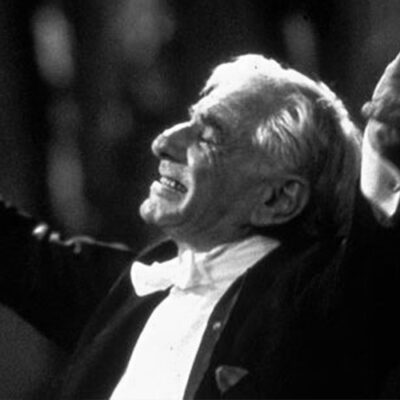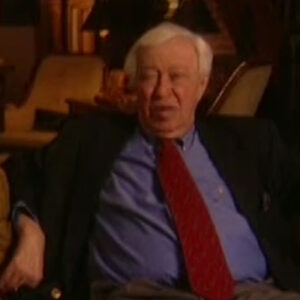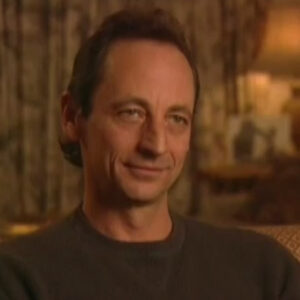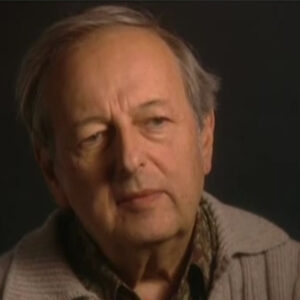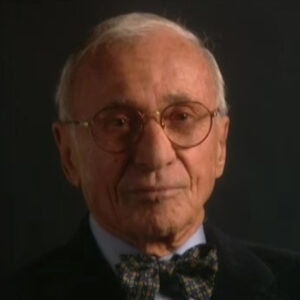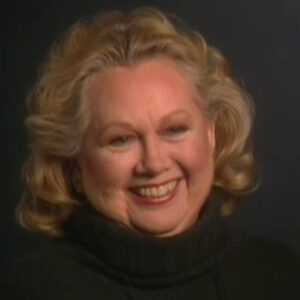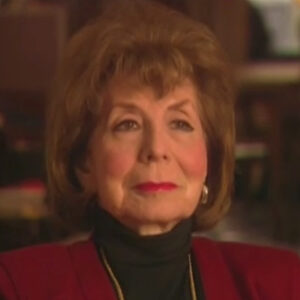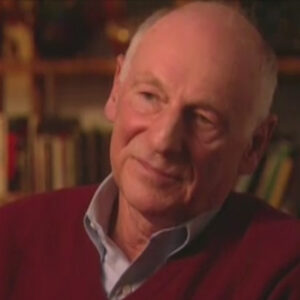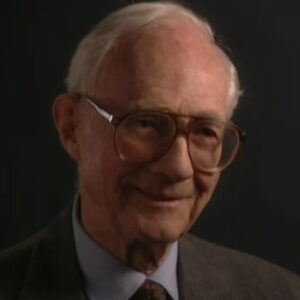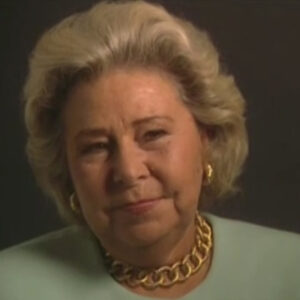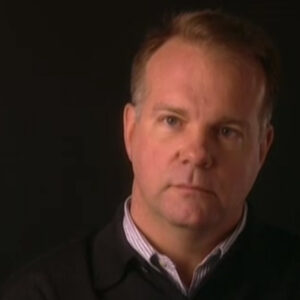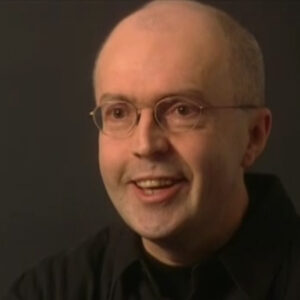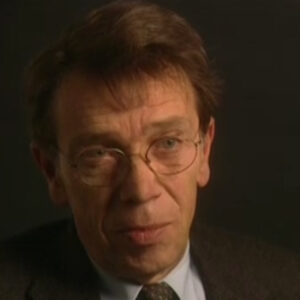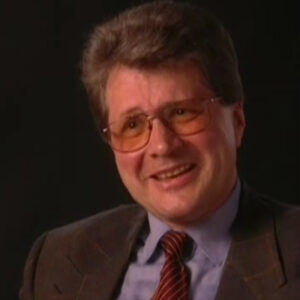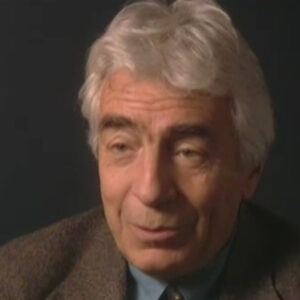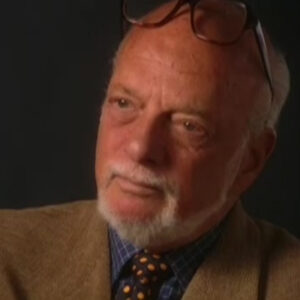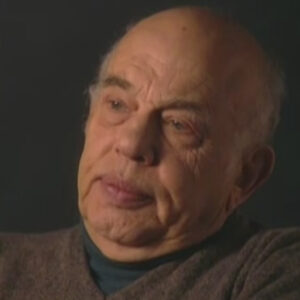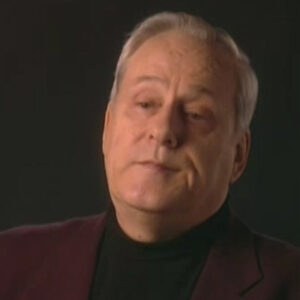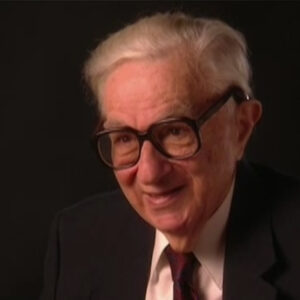Speaker Well, the first time I worked with Lenny, I think it’s more fun, the first time I actually met the man I was I was in it was my debut year at the Metropolitan 1986. And and Matthew Epstein was helping Lenny put together a cast for what he wanted was an American cast to do La Boheme with the Santita Chile Orchestra in Rome in 1988. So he was casting about and and the question of Marcelo was still open and. I was one of many that got to to audition to to Leonard Bernstein, and of course, when you get a call and says you can audition to Leonard Bernstein, it’s it’s, you know, great. And so being a stubborn song lover and all that, I thought, well, I don’t want to just sing for myself. I want to, you know, sing for Lenny and show him what I can do. Or, you know what I saying, so I took some water and I took, of course, similar songs and I took a bit off of excerpts of Bohem, which I had, of course, done many times before and all that and went over and was brought into the house and brought to the piano and said, oh, well, go ahead, warm up or whatever you want to do, then I’ll be done in a minute. So I’m the most D’Addario had done very much. And so we were just sort of running through the material and got out of the Mozah and I said, well, looking and just waiting, well, is it going to come or not? And apparently he’d been standing around the corner in one of his favorite things and he bounced around the corner, says, well, Mozart, we know you can sing. You’ve been doing it. And that’s very successful. Great debut. Nice to meet you. I lit up a cigarette and said, what else you got? And I said, Well, I’m obviously here for Boambee, Sudan. And you got something else, don’t you? And I said, Well, I do have actually some similar songs, you know, that I’d love to sing. In which one? Such fosberg after Shans. OK, great. So I start singing this song and Neil Goran’s playing the piano and he’s already started. No, no, honey, you’ve got to do this. You got to change this and I’ll give more Basara kind of thing. So I start to sing and Lenny sort of watching me and Lenny had a way of looking through you, around you and everything else, thinking of a million things at the same time and always knowing exactly what you’re doing in the middle of the song. It goes up very high. And Mahler gives very specific instructions about about a head voice and that the piano should be louder than the voice. And it should be sort of this duet moment of ethereal beauty where the boy is actually talking to his imagined comrades before he’s being shot and killed for desertion because he he just had been too drawn to his mother’s soil sort of thing. And so I obviously sang it the way that Mahler said you should sing it and singing songs and so forth. And and he looked up and he said, Do that again.
Speaker OK, so I went back look, Neal, you know, I found God, you know, so I did it again.
Speaker No, no, don’t do that again. So I went back to the same section, so he looked amazing. How do you know do that? I said, how do I know to do what is it? What’s wrong? Nothing’s wrong. Don’t be silly. How do you know to do that? That’s good. That’s right. That’s what you should do, that that sort of thing. So. Well, that’s what it says in the score. I said, oh yeah, but there’s something else. Now tell me something. Why do you do this over here? So we start talking and tearing apart, which I did from a an emotional psychological standpoint in the text, and that it’s obviously a mixture of two poems and all that kind of thing. And we started talking about it. Of course, he knew every song of Mahler’s inside and out. And so then he started really coaching and what was supposed to be a 15 minute audition turned into an hour and a half visit with Leonard Bernstein. I had brought other songs as well.
Speaker And and.
Speaker And and at the end of the day, I mean a couple of times during the session, in fact, at one point he says, well, I guess we better hear some. Boy, I’m to see if you can sing that, too. So I sort of sang about three lines. Oh, yeah. That’s what I thought. What else? One of them all of you have. So I started singing activities in and.
Speaker He says this is very interesting. It’s very I he said nice things, a little embarrassing, but he’ll be doing that.
Speaker So can you get can you show me?
Speaker Not really be sort of funny. I guess it’s the you know. To, I guess, have to be as to be as a young to to say, huh?
Speaker I’m sorry, I know no.
Speaker No, no, I’m not going to sing, I don’t think it makes it would seem sort of sort of silly without the piano, but the point is, a lot of times things get sung and expected just to sort of figure out what it means. And and I believe in in in trying to find that character’s voice. And when he and when that boy comes to that part of that song, it’s not just about Mahler telling you to sing in a head voice. The boy is very emotional.
Speaker And he and he’s very a very plangent, very high lying pli in his voice.
Speaker And he’s very, you know, brutal, Tuomo, and not you read all too small, you know, to find that other side of his of his own expression, his own personal psychology. And I think that’s what he was really was he was really landingham to. And I tend to sing songs. I don’t you know, I don’t think there is a temple for music. It’s a it’s a heartbeat. Questions of metabolism question. And people ask me what I learned from Lenny. I guess I learned to be audacious enough to believe that if you could analyze music with Lenny for hours, you could listen to him lecture. You could be dumbfounded by his his knowledge, his depth of knowledge, his technical knowledge. Any one of us know his these great lectures that he gave on both television or the personal classes, all that sort of thing. But what Lenny made music, it was just about the truth. How close can you get to the truth of that psychological moment that is given to us in a musical context? And I. To me, that’s that’s to me, that’s really genius, it’s the ability to to walk away from the parts of your knowledge and give yourself up to the to the sum or the goal of what it is you’re trying to articulate. And that to me, was what just made Lenny so miraculously different than other people, because as phenomenally even frighteningly intelligent as the man was. There was just this gorgeous, beautiful musical soul that ignited in some sort of intoxication of human spirit that we just sat mesmerized, mesmerized, and that’s exactly what happened as a partner used to say to him after the few concerts I was able to do with him, especially Mahler concert. You know, you felt good in me tonight because the man just sang through, you loved singing. I think that was a real regret. I mean, I believe him when he said that he really wanted to be able to sing and he really couldn’t.
Speaker And he wasn’t.
Speaker Yeah, but I don’t know anyone that sang with Lenny who didn’t feel that they sang in a different dimension and consciousness. If you want to use those kinds of words than than what they were used to. And you couldn’t help but grow from that, that that that he allowed me that at such an early age. And early part of my development is, is one of the great gifts that God has given me.
Speaker And, you know, I I’m.
Speaker I’m not a very old person yet, but I really regret not being able to offer Lenny some of the connect the dots that I’ve been able to do since I worked with him and then make music with him again. I think he would enjoy that. I know that I would use. And particularly, that was certainly something I’ve come to feel from people I’ve spoken with because, you know, before you start really speaking to people, you just read these books and read the reviews and.
Speaker It’s not a complete picture. No, I’ve read the books. Yeah, well, no, I’ve read a couple. I quit reading. I just to just. I mean, first of all, the little boy, so much, but what’s really coming to is is not only true.
Speaker Oh, yeah, that’s what that’s what the. You know, I’ve got to experience things for everybody. Well, I mean, to me, when I think of Lenny, I kind of paraphrase the great Walt Whitman quote, I am large. I carry many contradictions. And I just think I think actually great personalities. You know, what a particularly a particularly in some ways cynical time, but a very exacting time in our in our civilization where where we think anything should be able to withstand the most torrid examination and the most blatant.
Speaker Soul baring criticism and still remain in and of itself intact, and I’m just not sure that that’s true. But that notwithstanding, I think we take for granted some of the myths and legends and great personalities that we so respect from the past. We take for granted that they, in fact, belong to a part of the past, belong to a part of a time that that is just simply more complex and greater than than soul bearing examination will ever allow. And I think Leny belong to that. I mean, if you think of the time, great, many had great breakthroughs in the 40s and he lasted into the up to the 90s. But, you know, the real, real linear time with the 60s and the 70s and to some extent the 80s, obviously 80s as a as a very famous great old Maestre.
Speaker But, you know, think of this. Think of our civilization. And this time and I think we I think it’s just too simple to go back and start pointing a finger at certain personality traits. It’s like what we’re doing to Thomas Jefferson or what now seems to be popular JFK.
Speaker We have to find a way, it seems to me, to to criticize and abhor the obscenities of an age without denigrating the men and women that lived in it. And I don’t think we’ve figured that out yet. And certainly most of the pop biographers of Leny don’t get it. They don’t understand that kind of personality. And I have no equivocation to say that on camera. I vehemently resent the naivete, the ignorance from which some of these people are trying to criticize a musician. And I think that’s the first for the first point that has to be met with a man like Leonard Bernstein, he was an artist and he was a musician. He was a lot of other things, too. And he had a huge world outlook and a huge philosophical base. But he’s his life was dedicated to the articulation of ideas. And I think I think we need to start from that and not necessarily the the byproducts of a huge personality or our own awareness in American times and modern culture to the notion of celebrity, which grew exponentially during his lifetime. I think it’s just so complex.
Speaker I totally agree. Good to Rob, thank you for that reason that.
Speaker People spend so much time dealing with all these other things. Number one, you raised. The work has changed. Sometimes I feel almost like too much, you know, that they actually get very. It’s a very complex set of things going on because your perception of Lenny’s. Do you have any idea how much time did you ever get a sense of how he felt about his place musically?
Speaker No, I was never part of that kind of close personal reflection of the depression. I was I was around people who were part of that process. And I may have derived feelings of that. But I must say, I’m I’m I’m a fan on the field at this point. If I if I got into that. So did you talk about Molik? Well, I think he talked about how he didn’t lecture me about Mahler’s life or what, you know, this is what was what Gustaaf was after kind of thing. Well, a little bit, yes. Especially since I’ve always been fascinated with Mahler songs as a as a piano version versus an orchestral version. And you always have to decide, especially when doing orchestral songs, what what markings pertain to what and what you know, where you’re what you’re trying to say is, is this a specific information from from Mahler to the performers that say you must this is what I’m talking about on paper or is an indication of a realm of possibilities if you’re sitting at a piano or if you’re in front of an orchestra. This, to me, that that seems perfectly natural to a man like Gustav Mahler, whose whose passionate goal in music making, in music writing was one of dialogue and exploration. I just you know, I don’t think that we should take a lot of signals as some sort of holy writ. I think any great of any of the great composers, if you read the letters, you see that very clearly. Any of the great composers, there’s a realm of possibilities. And that’s that’s where somebody like Lenny was miraculous, quite frankly, because he just had a he he had a way of like for instance, I remember working on the lead on his forehead. And so I, you know, all prepared and sort of thing. And there’s this wonderful in the piano version. The first bars are two, four and then three forward as a younger Taqaddum.
Speaker Bom, bom, bom, bom, bom, bom, bom, bom.
Speaker And in the orchestra it’s it’s all in two four with a triplet.
Speaker Obviously it becomes gardam. Bom bom bom bom bom bom.
Speaker And it’s mark 60 to 63. And after the two bars as a Firmat on the bar line, after the first four bars, before the song, before the singing starts and the singing starts, it says above it just a bit slower. Lasama And this is supposed to go between 63 and 60, which is, you know, the difference between a heartbeat and heartbeat. You know, there’s about that much different. And so I go and all prepares when I let him tell me what you know, what are we going to do? This is exciting. It’s a great moment because this is a this is a paradox. And Mahler’s music that Leonard Bernstein is going to clean up for me is this great, Lenny, how should we do this? And he looks at me, says what?
Speaker You know, I don’t understand the problem. Have you never been to a Jewish wedding? You know, they got a one year old little time, time, time. And the guy comes in these things a little slower where mineshafts. Oh, little later on we play on.
Speaker It was he’s right. He’s right. It’s very simple situation. Somebody is playing the wedding music and somebody is not happy about it. It’s just all there is to it. And somewhere down the line in the song, the same tempo sort of hangs in there and he starts thinking about natural things. And here we are sitting in the middle of Mahler’s world. And it’s just, you know, and and I tell that story to anybody I work with, you know, when they said, well, how do you like to manipulate these temples? I said, Don’t you play the wedding music? I’ll be sad. Forget it. Let’s go. It’s wonderful. It was it was it was one of those sort of aha moments of my life.
Speaker But that’s that’s the side of Lenny. That was it was wonderful. And he was completely in tune to different ways to sing things based upon what you can do.
Speaker There wasn’t no way where you got to sing this line. Yeah, we had great discussions about tricky things. And the candidate and leader were were already in my lifetime some some singers, especially a baritone that he was going to work with on the piano for the total leader wrote and said, you know, I just can’t negotiate this passage very well. I don’t, quite frankly. Excuse me, Maestro, with all great respect. Thank you. Said it very well. I mean, the words don’t sing about this desert or Mahler wrote back and said, well, I can’t change the phrase because it’s too part of the soprano line in the orchestra. It goes with the strings. But I can get you a different scan of the words and he scribbles out a different scan of the words. Now, this is a man who we chase around Mahler, meaning me looking for the, you know, the Holy Grail all the time. And of course, he’s just sketching it out. It is only as far as the key of the other song, don’t worry about, I’ll play it down a half tone at sight.
Speaker That’s not an issue. The song was introduced Just Leave and which is considered a woman song. And here’s Mahler, the composer telling baritone Yohannes Mascotte, his colleague in Holland, and music in a letter. Don’t worry about it. When we do our song together, my song together, I’ll play it down a half. It’s not an issue there was. There’s just something more, as we say in German, Zeb’s forced entry, more self understood in the whole process. That’s to me what Lenny was so genius about. It was cutting through everything else. But this idea of what what Lenny could get to in terms of the self understood and it reminds me of sorts of great stories. But this this one one guy who had studied with him at Tanglewood said he could go he’d go on a half an hour excursion of the most detailed analysis of of a brook. Symphony and the fugal moment and the exponential, blah, blah, blah. I mean, good Lord, whatever else. And at the end it would be sort of you sort of shut the book and you said, so that’s that. What does it mean anyway? Well, how are you going to make music out of that? And then you go off and they’d be on the piano or they’d conduct each other, they’d work on it. And it would be absolutely nothing about this harmony analysis and this, you know, everything else. Not to say that that’s not necessary, but that’s just and that’s very necessary for a conductor. They must. And that’s what makes them so phenomenal, actually, when they understand the nuts and bolts. But we’re dealing with an entity and we’re dealing with an expression that has to be let free, not controlled and lectured, but understood so that it can, in fact, invigorate and vibrate. And that’s what Lenny did so well. It’s like some there’s a wonderful story was it was Strauss Strauss conducting one of his later operas. And at one point he stops orchestras, turns around to some some young student who’s been tagging around and said, what is that chord that’s just been played in the yard? There’s this man goes, well, except on October 13th.
Speaker And then, of course, he turns radiographer. He said, You see, I can do that as well. And I had absolutely nothing to do with the music. So it’s always this balance.
Speaker And I just always I always marveled at the way Lenny could just could could just synthesize those things, both in observing him make music, but also to make music with him, how he worked with the orchestra, phenomenal ears. Can you talk about that?
Speaker Well, by the time I worked with him, he already commanded such a respect and and and abject devotion by any musician that sat in the orchestra that there was no convincing, there was no sort of look, I want you to because of this, nor were there any tirades on his part. And we all know some of the footage where he could just, you know, skewer somebody for not doing it when he wanted to or how he wanted to. It was a time where were things that were sloppy or not correct would get sort of a glance over the top of the reading glasses. And of course, you wanted to just die. That was less for the singers. And then you see that in the orchestra. But what I what I saw in Leonia in especially in the sense of Churchillian Romeu during the boom where he was grappling with a piece he knew for 25 years but hadn’t done for 20 with an orchestra who who may or may not have been. Practiced in playing opera, a young American cast, I mean, there are a lot of very interesting cross mixtures of musicians and cultures and Lenny love that sort of thing. And so there was an inherent inherent dialogue and Lenny could meet. Each one of those needs and perspectives absolutely straight on the American singer in Rome doing an icon of the of the Italian literature or the or the Italian orchestra playing opera irregularly. But obviously growing up with this is like mother’s milk as part of their own culture. In an orchestral setting, not an operatic setting, instrumentalists that were both young and mature and so was it was one it was one of invited dialogue, as long as the exploration was to understand what it was that Lenny was going to ask from you. There was never a question woman who was conducting who was conducting this was not a committee decision. There’s no there’s no issue about that. But I and I almost hesitate to say something that because for the person who’s not a musician, who’s always observing music, especially the conductor from the other side, that plays into clichés where the conductor and the benevolent dictatorship and so forth, and that’s nonsense. There has to be a focus. And we live in an interpretive real world of the conductor, especially in his lifetime. And I don’t think that’s a bad thing.
Speaker But that’s where the where the focus went. What do you mean especially.
Speaker Well, I think I think today there is. There is I think we do have the great interpreting conductor tradition.
Speaker But I think there’s also other soloists across the board, instrumentalists and vocalists as well, or even especially in the opera world where you have now you have rigid theater and different areas where where perhaps it isn’t just about that one leading moment at the end of the baton or that one person in front of all the forces. There always has to be some focus. Otherwise it just becomes a dissipated randomness that’s, I think, very dangerous. That was never the case with Lenny, ever.
Speaker Do you think it worked?
Speaker But she wasn’t. I guess what I want to leave that unfinished. It wasn’t a demand situation. It wasn’t. I’m the conductor. Do it my way. Maybe that’s the point is that Lenny’s ability to music, to make music and be music. And that’s a huge differentiation for me. I mean, Lenny just was a musical phenomenon that everyone, of course, like a moth to the flame, just migrated to this huge musical personality that was clearly doing something where we all a process we wanted to be part of, which is really what music making is about. It’s not about landing the home run of interpretation. Interpretation is jihad success. So nobody said one’s is usually for the people who don’t get it in the first place. And I think there’s a lot of wisdom in that statement. And I think that’s what I admired so much about Lenny, because I, of course, went like everybody else thinking I’m finally going to get the secret of the you know, I’m going to open up the books and find out what 63 to a quarter in Mahler’s music really means. Yeah.
Speaker Bunk, does it mean something or does it mean nothing? And that’s what was so wonderful, making music for the money, it always meant something. And he was the first one to be, I think, depressed and upset if he felt he’d left.
Speaker I think Lenny was probably if you left something on Saturday, left it incomplete, I think Lenny probably hated mediocrity and ambiguity as much as anyone I’ve ever met in my life. And we define those people as perfectionists, but I prefer to look at it perhaps a different way and one.
Speaker Working on Madeleine. Tape recording, it was recording, it was live performances that were taped, recorded, it was not videotape, no Estherville.
Speaker Although, you know, I’m not sure that’s true. No, I think I think ri. Did either they came and did a radio broadcast with this or they, in fact did run a couple of cameras in the back for the process? I’m not sure. I think there is somewhere private documentary footage at least of that whole process. But if that were true, you’d think we would have heard of it by now. But something that’s a question worth researching, I’m not entirely sure that’s true.
Speaker Lenny was I mean, he didn’t do much. No, but from what I can gather in the seven or eight hours that he did. Research, there were always something quite extraordinary, which isn’t surprising, given the. The combination did you find working with him on the opera a different experience in.
Speaker Well, certainly, but that would be that would that would be a basic difference between the genres themselves, really. I mean, I was part of a I was part of a large cast in a large endeavor and a huge ship ship, all rowing for the shore together. And in a concert world, especially Mahler’s concert world, the psychology is so intimate and so complex that that the the understanding between especially between conductor and singer is just infinitely closer. Was his attitude towards the music more detailed or less detailed? Absolutely not. Completely devoted to whatever specifics it had to do with the orchestra setting was completely different. He could ask things with the bit of a monarch that he certainly couldn’t have asked from the center to tell you. That is not by any means a denigration of the centage to a different different value, different understanding, different cultural context. Perhaps the same would have been true had he been doing the one with the uniform harmonic. I don’t know, but that’s irrelevant, really.
Speaker Did you like him or.
Speaker He adored Puccini, adored Puccini, adored La Bohème. And I remember in the audition he hadn’t he he said he hadn’t opened the score for, you know, fifteen years. And I sang a little bit and he kept on singing and he sang the other parts and then he sang somebody else’s part.
Speaker And then he can only like, don’t you love this moment? The fourth act? And he starts singing the the Mimi Aria. And he said, Oh, and and of course when she dies, you know, when he gets on and he’s got a cigarette and of course then there’s the first act. Now we really got to find a way. And he started already talking to me. I knew I had the job at the audition.
Speaker I was dead sure of it. What I didn’t know is that he walked out of the audition and got into his car and got on the phone or got into somebody or whatever to whatever meeting he was already an hour late to and said, I’ve I’ve I’ve found the next young singer that I want to spend a lot of time with and started yelling from the rooftops that this was. And within two days, my manager was on the phone with Harry Krop looking at tours and some of the ideas came to fruition. Some of the things he changed his own mind didn’t go on to that orchestra. I mean, you were always at the at the ebb and flow of a very dynamic life. But it was it was a hugely exciting and and very rewarding.
Speaker Do you have any more stories like the Jewish wedding story and in terms of letting explication of things?
Speaker Similar sorts of things. That’s right. That’s that’s a no. And the minute you ask me for stories I can’t remember and I’ll give you I give you one after the other, you know. Good. Oh, you’ll have a it’ll be rock and roll.
Speaker You know, Lenny desperately wanted me to do the candied with him, and I just wasn’t one. I wasn’t free. But, you know, for Lenny obviously made yourself free. But but I just didn’t feel that when he did that last recording of Candy that I was up to the role of Pangloss and.
Speaker I regret it and don’t regret it. I regret it just simply because I’ve been great to had another time with with only there were a lot of projects on the board with learned that that that, you know, if I number them off would seem pretentious. But there were a lot of there were a lot of plans with him and I would have enjoyed maturing with him. I always felt when I saw him again and same from again, I was having sort of a new set of exams and, you know, how am I doing? You know, he came to a couple of my performances when he was in Vienna doing other things when I was singing at the start over and heard me sing, you know, uh, the Nazli Figaro.
Speaker And I was very, very excited. And I cherish his opinion. I mean, he knew it’s funny when you say when you list off the very few operas that he did because you always had the feeling that he knew everything and it wasn’t a piece of music that he hadn’t looked at and he didn’t need it. Too many looks at anything to really get it, you know.
Speaker And well, I think when you talk about Mozart and when you talk about Lenny as a as a conductor, you know, Lenny had a huge following. And I was I was you know, I’ve done a great deal of work. When we’re talking about Mozart, isn’t it a shame they didn’t didn’t do Mozart operas, which it is.
Speaker I mean, can you imagine the white heat of a Don Giovanni that that Leonard Bernstein would have demanded from everyone?
Speaker And I was having a conversation about Mozart operas and symphonies and so forth with Nicholas Onagawa, and as I had a lot with Nicholas, having learned a great deal from him and I said, you know, well, what do you think about a person like Leonard Bernstein? And Nicholas just shrugged his shoulders of genius. One of the greatest musicians that we’ve ever had on this planet, and it’s really sad. Oh, yeah, fantastic. And he started naming off recordings and works. And I said and I said, why? And Mozart, he said, Oh, yeah, Leonard Bernstein’s Mozart. Fantastic, wonderful dialogue, infinite exploration of ideas and so forth. And I thought that was really quite startling because everybody thinks that unquote works and sort of this other world and other dimension. And everybody from the outside thinks that all of these guys, you know, whoever it is that is sort of on the on the on the tips of people’s tongues about Mozart lives in their own isolated opinion of how music music is made. And that’s just simply not true. And especially the great musicians they talk about when Lenny died.
Speaker You know, Lenny, I was the day after it was in the paper fact, it might have been the day that was announced in the paper. I was singing Don Giovanni at the Met with Jimi, you know, and. And Jimmy just, you know, came in and shut the door and we embraced and didn’t say anything, they said we’ll go out and sing for Lenny.
Speaker I’m sorry. OK.
Speaker What are the worst thing I had to do, the absolute worst thing I had to do is the the videotapes of this of the Möller cycles with Lenny. When they finally got to produce him, they they weren’t out as video discs before Lenny died, and they had they had come across some huge electronic bumps where they just simply were not producible. And so they. They built a facade in a in a warehouse in Vienna.
Speaker And I mean, absolutely, it’s a replica of of just exactly the kind of angle they needed to smooth out these very specific little technical blurbs and glitches they had in the tapes. And they were able to cover it with the with the music. But they needed me and I needed to sink to it. They needed just to be able to pass by my face. Do you know how it is? You know, I don’t think I’m telling tales out of school. And this was about not even a year after he after he died. And I had to go in in exactly the same tax. Exactly. You know, they had exactly. We had to look at the tapes and exactly how astounding all that is, replicate all of that just to get a movement image and sync through those those performances.
Speaker I really lost it that day. That was my huge. That was my huge cathartic release. Of those times with it was it was a great time. I don’t mean to get model about it. I’m so incredibly grateful for. The brief moments of a huge life of Leonard Bernstein and I don’t mean by any means to seem like I have any special entry into Lenny’s psyche. I was one of many, many people who had the privilege of of walking that path of music. Exploring that process of musicianship, however you want to, however politically you want to say it, that Lenny was so uniquely able to provide to musicians around him or to himself, it it enriched my life enormously. I’m hugely grateful there’s nothing and I’ve been asked, you know, the different books and of course they’re trying it all, the last sources and that sort of thing.
Speaker I don’t really have a lot to say about that. You know, certainly nothing unique and nothing anybody else can say about it. It’s a great experience.
Speaker But for us. What do you think he meant when he talked about a great deal of money?
Speaker Well, I think what Nicholas is talking about is simply the idea of dialogue in music. And and I don’t think he meant that that Lenny was having a particular dialogue with with Wolfgang himself, although we all try to think that we have that sometimes, you know. But the fact that he let. That any particular symphonic work is not about its gestalt, it’s about it’s conversation that becomes an entity in and of itself, and to understand that, to understand that dialogue between winds and brass and strings or the great huge cry of all of them together or the the bit of humor in this bit and the bit of seriousness. And it’s always it’s wonderful to see conductors and this tape of the art of conducting. You know, this is a fantastic video to watch these great these great conductors bring that sort of, you know, the strings saying, no, no, no, no, no, no. Would you stay still in the winds laughing and gurgling about especially late 19th century music? You get that kind of thematic dialogue. But in Mozart as well, you have these hugely serious themes that are being that are being cajoled by the rather self understood humor of of life, that crazy juxtaposition that we have as human beings between infinite banality and infinite genius. And we sort of hover. Between immortality and mortality in the same sense, and that’s all part and parcel of each one of us, and I think music is is somehow the language that helps us focus.
Speaker On. On that adventure. On that, what Joseph Campbell calls the bliss, finding your bliss. Well, I think it’s finding your harmony. It’s respecting what it is that you have and especially what it is that you don’t have, but what you can imagine and being reverential from where you came and being open to where you’re going and especially other generations and especially in front of us and back of us. That was the great genius of Mahler, quite frankly. It was his ability to recognize and embrace, illuminate the traditions from which he came and yet provide us with a a musical expression of where we were to go. There was no throwing the baby out with the wash water with with Marla, there wasn’t and there was never a knife that just simply cut and said, that’s all bunk. That’s that’s American history. And what’s the word?
Speaker And I know I’m anachronistic, that’s anachronistic, we’re not going to do that anymore, is this it was always an incorporation of that his setting of all of of of a very German poetry.
Speaker Wasn’t enlivening of that tradition. It was not a manipulation of it.
Speaker Well, that’s curious, you know, I I’ve sung a great deal of his music and, uh. Both the serious music and the and the lighter music, and I adore it, I think that that Lenny in his own lifetime was was vastly underrated as a as a as a composer of of classical serious music.
Speaker That’ll be something with your chat with Michael that’ll really be illuminating because that’s, of course, what he understands far deeper and far more completely than I do.
Speaker I mean, everyone knows Bernstine is the West Side Story kid, and that’s that’s great. And then in Vienna, of course, is a tradition of some of his later operas being performed and some of them work, some of them don’t work as well, whether they need to have a little work on their book or a different kind of dramaturgical. Look, I don’t know. That’s a that’s a question that we can all get closer to. There is never a moment in any of Lenny’s works that there isn’t some tremendous brilliance of expression that is just either so soulfully beautiful or so cleverly juxtaposed that it makes to stop you in your tracks and of of course, and that’s exciting. His symphonies, I find I’ve always found beautiful and intriguing. Complex, tough. For the same reasons that he was criticized sometimes when they came out of being too part and parcel of his time, I think that’s exactly what will make them so stupendous in the years to come. I think we’re heading into a new generation reflection where something like the mass is not only appropriate is necessary. I think it’s one of his greatest pieces. I’m a huge fan of the mass when I did on the town with Michael, you know, everybody. And we did all these bits that had been dropped and shuffled. And I didn’t like any other great show. I mean, when you think all the things you are was cut from the very month of May or whatever the show was because it didn’t work, I mean, it’s just unfathomable. The same thing with Lenny, you listen to this score is just absolutely unbelievable. Songfest, the Arias and Barcarolle. There’s a there’s a program that Michael and I want to do sometimes is called Lonely Moments, because there are just some songs that are just so many, like the Jewish Wedding from Arias and Becquerels. You know, it’s a fantastic piece.
Speaker Or from songfest, the candy shop, or especially one of my absolute favorite pieces on the face of this planet to what you said on Walt Whitman, poetry. That colossal meeting of minds between Walt Whitman and Leonard Bernstein is something I wish we had a lot more of. Quite frankly, I know he adored Whitman. It would be nice if he had done a whole cycle on Whitman. I think he probably stood Whitman’s contradictions as a as a prophet in America as closely as anyone could. And the musical essence of Whitman has been a very fun process for me to to deal with it in my own exploration of Whitman. Huge similarities, I think.
Speaker It was very interesting, I had thought, oh, they did then also have the same the same disciple’s and criticisms for almost exactly the same reason.
Speaker I mean, Lenny dared to be audacious and and show people their own their own audacious ignorance and audacious conservatism that he didn’t didn’t hear back from a fight. Neither did Walt. And Walt articulated something so intrinsically beautiful and necessary about the human spirit that we’re still a little afraid of. We’re still concerned. We’re starting to come to it, but we’re still nervous about.
Speaker The body and the soul, what what do you think Lenny was trying to say through his music that he had to pick one through? Well, I’m not sure I.
Speaker I’m not sure I subscribe to the school of thought that composers are trying to say something to their music. I think composers are hugely complex, intriguing, Antanas, of of things human and I think. I just the music I respond to. Is the music that seems to be an attempt at truth, an attempt at something pure, pure in the sense of of complete, of articulate, of of an honest attempt to articulate human passions and emotions, even if it doesn’t work, if it’s an honest attempt. I prefer that to something that fits a form.
Speaker Leonie’s Lennie’s music, to me, seems always an attempt to sometimes cajole, sometimes Tetch, sometimes show the cynicism, be satirical, be ironic.
Speaker But always for a greater good and and I think he was also a very mischievous man, I think he enjoyed enormously the mischievousness that he could he could put in music, confusing people, playing with people, giving them something terrifically banal.
Speaker I’m sure he wrote some piece of music knowing exactly that people would criticize it for the reasons they did criticize. Oh, it’s too simplistic. But although there goes Lennie again, copying Beethoven or copying Tchaikovsky, which is complete nonsense in the first place. But he knew that. And I think he just loved I think there was a lot of sort of, you know, get it if you can. But Ives was exactly the same way I was in his letters and his books and even the additions of songs where he said, if you take this song seriously, you’re more stupid than I. And I think there was a lot of that kind of mischievous. But that’s a mischievous mischief with some of that is, I think, unique to America.
Speaker It’s part of our inborn. Almost cynical look at things, you’ve got to prove that it works.
Speaker Why are you so sure about that? Well, it makes you so special. What makes that so brilliant? Is he really genius? Was he really a great person? Some of that’s healthy. Some of it’s not healthy. The borderlines can be blurred. And I think Lenny’s music very often takes us to the edge where we are somewhat embarrassed with ourselves with those questions. And I think that’s great. I think that’s necessary.
Speaker He seems to genuinely like cynicism, cynicism, or I think you’re right.
Speaker I use the word perhaps. In a context that is maybe perhaps not true to the word cynicism. No, I think he was an eternal optimist, without a doubt, in a cynical age. I think he was cynical to cynics. I think he was perfectly willing to let them bathe in their own cynicism. And I think he wanted to show that he could meet them on their own ground and live above it. You know, I think he was still troubled by his critics who isn’t right.
Speaker One last question. I know you had to.
Speaker What are you going to remember? I mean, I was at a dinner party one night speaking of critics, and and I was raving and carrying on about all the working with Lenny and how wonderful it was. And as another person, very famous composer singers. Oh, Lenny, I was wonderful. I’ve learned so much from it. And this man finally had enough. And he stood up and he was actually a music critic. And he’s been stand up and sort of said, you know, well, I tell you what, you know, it’s just all that jumping around. I never hear the music.
Speaker And we all just sat there with our mouths open, you know, and said, well, what’s that got to do with it? Don’t I mean, if you don’t hear the music and you really, truly only see the jumping around, whatever that might mean to him, it was just such a ridiculous kind of statement. But then what is the Leonard Bernstein supposed to do with a person like that? And, you know, if you’ve got a seven million readership writing something as stupid as that and you’ve got of course, you get frustrated, I’m sure he felt himself marooned sometimes.
Speaker This must have been an older critic, right? Hmm. I’m not going to ask you what it was, but I really think that there was a time in the 50s and 60s and Glenis was so unique in terms of his.
Speaker Style. And his techniques and which is it just made an older generation just decide what to do with it.
Speaker It was also a time when the crossover between church was just wasn’t accepted, actually.
Speaker Well, I think you’re absolutely right. I think Lenny brought us into our new times in a lot of ways. I think you’re absolutely I think he did make people decidedly nervous.
Speaker I think he also confronted a lot of cliches that we had about classical music versus. Popular music, which is actually something that we invented in this country, quite frankly, which I still don’t understand why it should be or what the point is, but nevertheless, I’m not looking.
Speaker And if you don’t want to answer this, you don’t have to because I don’t want you to feel like you say something glib. But I’m wondering if you have any thoughts about legacy in terms of looking at Lennie’s time of the 20th century, looking at music, looking at American music. What is the hole that what is left? What’s the legacy?
Speaker Well, I think the vacuum that has perhaps been created by his departure is a vacuum that anyone feels after a great personality has has departed the physical dimension and become part of our memories. But what I think is so wonderful is not only through the recording industry, and that’s the great value of recordings, quite frankly, but also through the but also through the television medium. I think that, in fact, I was just having this conversation with with Harry Kraut and Nina, Lenny’s daughter, that I personally think the Norton lecture should be one or one of every college level music class.
Speaker I don’t think that anyone should be allowed to take any music class in the rest of the curriculum until they have sat and listened to these wonderful lectures that Lenny gave at Norton, which gives you such an incredible palette of information in such an accessible manner and already presents you with the idea that everything is part of a connected dot, synchronicity, whatever you want to call that, that then you can go on and go farther.
Speaker I don’t think there’s a more concise, accessible body of knowledge about the appreciation and learning of music available today, and I’d feel so basic to that.
Speaker I think it would be wonderful if that was that was simply part and parcel of understanding. The young people’s concerts are great, just like they’ve been written. Introduction, the orchestra’s great. You know, there’s a Virgil Thompson’s music. You know, there’s been great epic moments in the 20th century of understanding of music. And his book, The Joy of Music is just terrific. And I think those those kinds of documents certainly help.
Speaker Buffered the feeling of vacuum, of having left the fact that he wrote so much and he wrote so many so much music, I don’t I don’t I’m not preoccupied with a vacuum.
Speaker I’m more preoccupied with with transcending the cynicism we have today to get to the good that he really left us. I’m not sure we’ve digested all of that. I think there’s another dimension and it has to happen in a way that people don’t sit there and sarcastically say, oh, yes, well, of course, the Bernstine family wants to promote the legacy and and, of course, his foundations that were founded for him that that hit his taxes and all that sort of thing want to keep blah, blah, blah, blah, blah, blah, blah. That’s simply not true. His devotion to education and to the enriching of the human mind in every walk of life was as committed and as democratic as anything Walt Whitman ever wrote. And I think we should take Lenny at his word and and let him do that, because he did it as well as anyone has ever attempted in our country and certainly in our generation’s.

